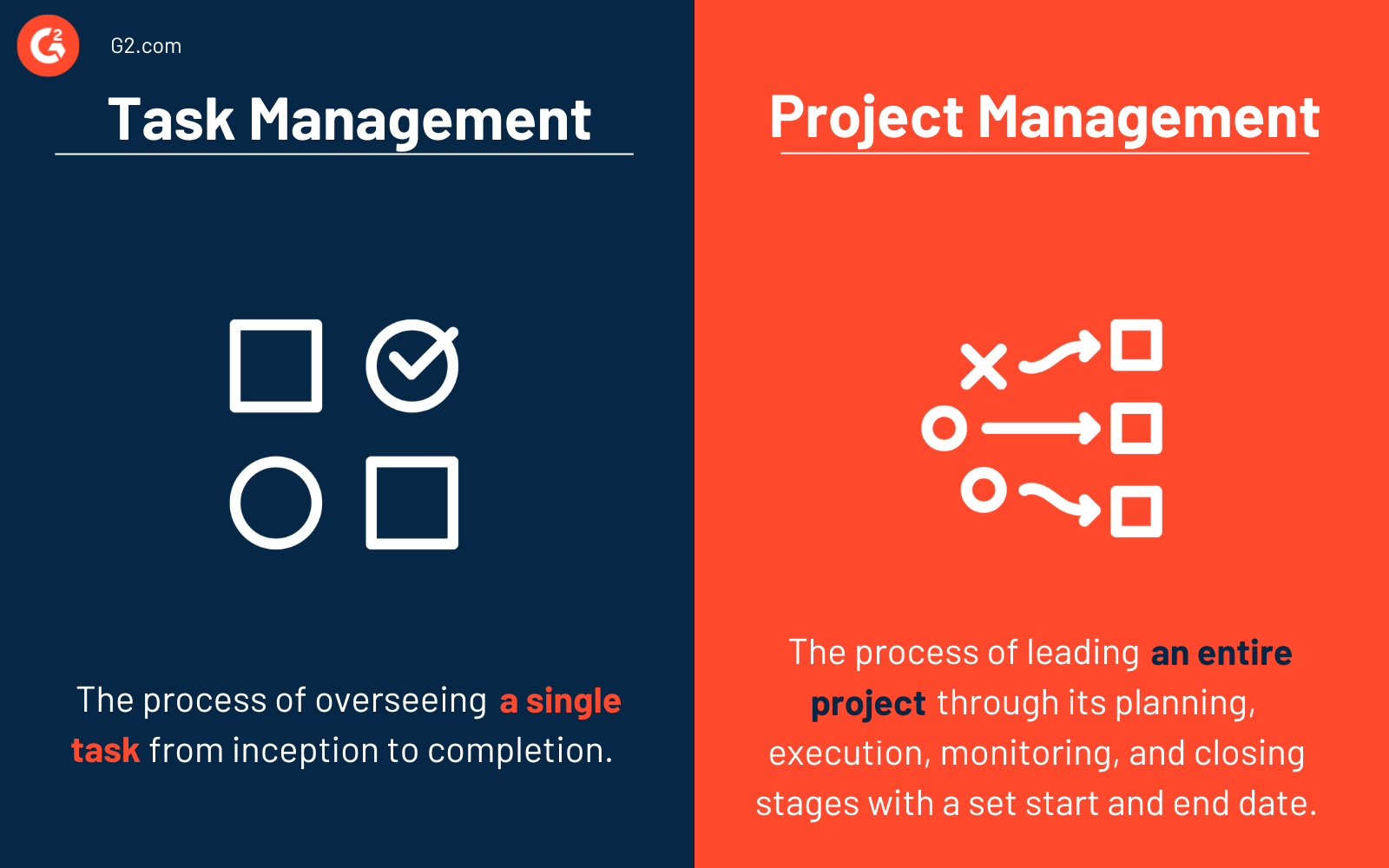¿Qué es la gestión de tareas?
La gestión de tareas identifica tareas, las prioriza según su importancia y urgencia, y asigna recursos para asegurar que se mantengan en curso. Involucra establecer plazos y monitorear el progreso para aumentar la productividad mientras se reduce el estrés y la sobrecarga.
Una gestión de tareas efectiva implica dividir proyectos más grandes en hitos alcanzables. Crea tareas más factibles que los profesionales consultan a medida que avanzan hacia sus objetivos. Incluye el uso de herramientas como listas de tareas, calendarios o software de gestión de proyectos para mantenerse al tanto de las tareas y asegurar que nada se pase por alto.
Tipos de gestión de tareas
Los profesionales eligen un tipo de gestión de tareas dependiendo de sus necesidades y preferencias, experimentando con diferentes enfoques para encontrar el que mejor funcione.
- Listas de tareas son listas simples de tareas que necesitan completarse. Pueden escribirse en papel o crearse usando herramientas digitales como aplicaciones o software. Las listas de tareas son una forma sencilla de monitorear las obligaciones laborales.
- Priorización de tareas implica asignar un nivel de prioridad a cada tarea según su importancia y urgencia. Dirige a los profesionales a enfocarse y completar las tareas más críticas a tiempo.
- Bloqueo de tiempo incluye programar secciones específicas de tiempo para diferentes tareas o actividades. Ayuda a los equipos a mantenerse enfocados y terminar las tareas a tiempo.
- Gestión de proyectos comprende agrupar proyectos más grandes en tareas más pequeñas y asignarlas a miembros específicos del equipo para ayudar a terminar los proyectos dentro del plazo y presupuesto.
- Metodología ágil es un enfoque de gestión de proyectos que descompone los proyectos en tareas pequeñas e iterativas completadas en sprints.
Beneficios de la gestión de tareas
La gestión de tareas es una habilidad esencial para lograr objetivos de manera más eficiente y con mayor facilidad. Varios beneficios provienen de implementar una gestión de tareas efectiva en la vida personal o profesional.
- Gestionar la carga de trabajo. Mantener un ojo en el calendario ayuda a decidir qué tareas priorizar y cuáles tienen plazos próximos.
- Mejorar la productividad. Los profesionales aprovechan al máximo su tiempo priorizando y completando tareas importantes. Les permite lograr más en menos tiempo.
- Evitar la ansiedad: Cuando las personas entienden qué necesita hacerse y cuándo, se sienten más en control de su carga de trabajo y menos estresadas o abrumadas, lo que mejora la salud mental y el bienestar.
- Mejorar la comunicación. La gestión de tareas mejora la comunicación del equipo al proporcionar una imagen clara de qué tareas están asignadas a quién, cuándo deben completarse y qué recursos se requieren.
- Mejor gestión del tiempo. Una gestión de tareas efectiva ayuda a los profesionales a descomponer proyectos más grandes en tareas más pequeñas para completarlas, evitando la procrastinación.
- Mejorar la responsabilidad. Cuando las tareas están asignadas y rastreadas, es más fácil responsabilizar a los miembros del equipo por su trabajo para que todos contribuyan equitativamente.
Métodos comunes de gestión de tareas
El método de gestión de tareas más efectivo depende de las necesidades de cada individuo o equipo. Experimentar con varias técnicas y estrategias es esencial para encontrar la mejor. A continuación, se presentan algunos métodos y estrategias de gestión de tareas que los profesionales utilizan para organizar y priorizar tareas.
- La Matriz Eisenhower divide las tareas en cuatro categorías según su urgencia e importancia. Las categorías son: urgente e importante, importante pero no urgente, urgente pero no importante, y no urgente ni importante. Prioriza las tareas y se enfoca en las más críticas primero.
- Técnica Pomodoro se basa en trabajar en intervalos enfocados de 25 minutos, seguidos de un breve descanso. Los usuarios dicen que les ayuda a mantenerse enfocados, evitar distracciones y asegurarse de tomar descansos regulares para prevenir el agotamiento.
- Getting Things Done (GTD) agrupa tareas en pasos más pequeños y accionables y las organiza en diferentes categorías. Las categorías son: proyectos, próximas acciones, esperando, programado, y algún día/tal vez. Asegura que nada se pase por alto.
- El Método Kanban coloca tareas en un tablero Kanban, que está dividido en columnas que representan diferentes etapas del ciclo de vida de la tarea, como por hacer, en progreso y completado. Ayuda a las personas a rastrear el progreso y asegurarse de que las tareas avancen eficientemente.
- Inbox Zero tiene como objetivo cerrar todas las conversaciones en una bandeja de entrada al final del día en un intento de lograr paz mental y mejor enfoque cuando el trabajo ha terminado.
Gestión de tareas vs. gestión de proyectos
Algunos pueden confundir la gestión de proyectos con la gestión de tareas, pero las dos tienen diferencias clave.

El proceso de supervisar una sola tarea desde su inicio hasta su finalización se conoce como gestión de tareas.
La gestión de proyectos lleva un proyecto a través de sus etapas de planificación, ejecución, monitoreo y cierre con una fecha de inicio y fin establecida. Un proyecto tiene como objetivo terminar un objetivo particular llevando a cabo varias actividades de trabajo realizables. Estas actividades se denominan tareas.
Gestionar un proyecto requiere una perspectiva amplia. Los gerentes de proyectos típicamente supervisan varios proyectos en curso con prioridades variables. Un análisis preciso de las conexiones y dependencias entre varios componentes es necesario para una gestión exitosa.
La gestión de tareas requiere un enfoque micro en terminar las tareas presentes. La participación y gestión del equipo son necesarias tanto para la gestión de proyectos como de tareas para asegurar que las personas puedan manejar múltiples tareas.
Aprende más sobre el marco ágil escalado y descubre cómo los patrones de flujo de trabajo ayudan a las empresas a escalar procesos lean y ágiles.
Sagar Joshi
Sagar Joshi is a former content marketing specialist at G2 in India. He is an engineer with a keen interest in data analytics and cybersecurity. He writes about topics related to them. You can find him reading books, learning a new language, or playing pool in his free time.




















